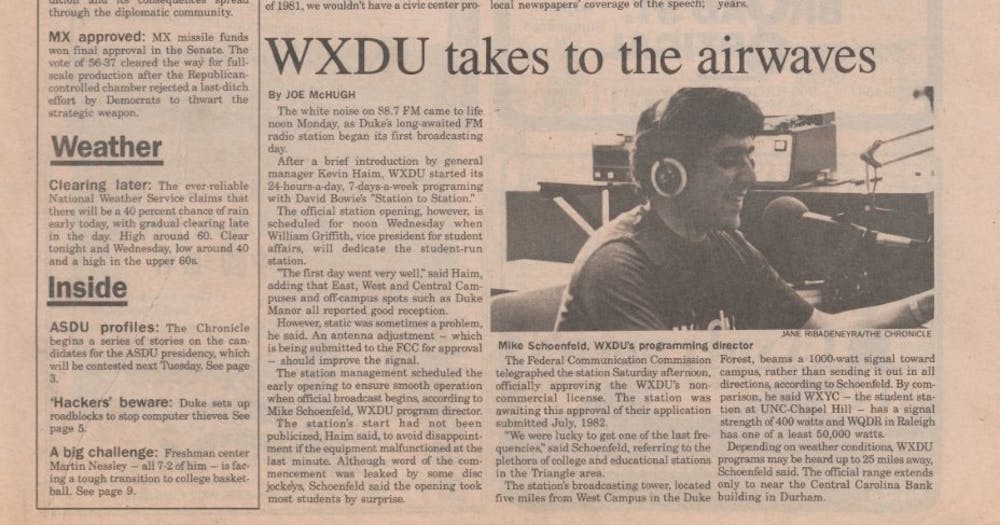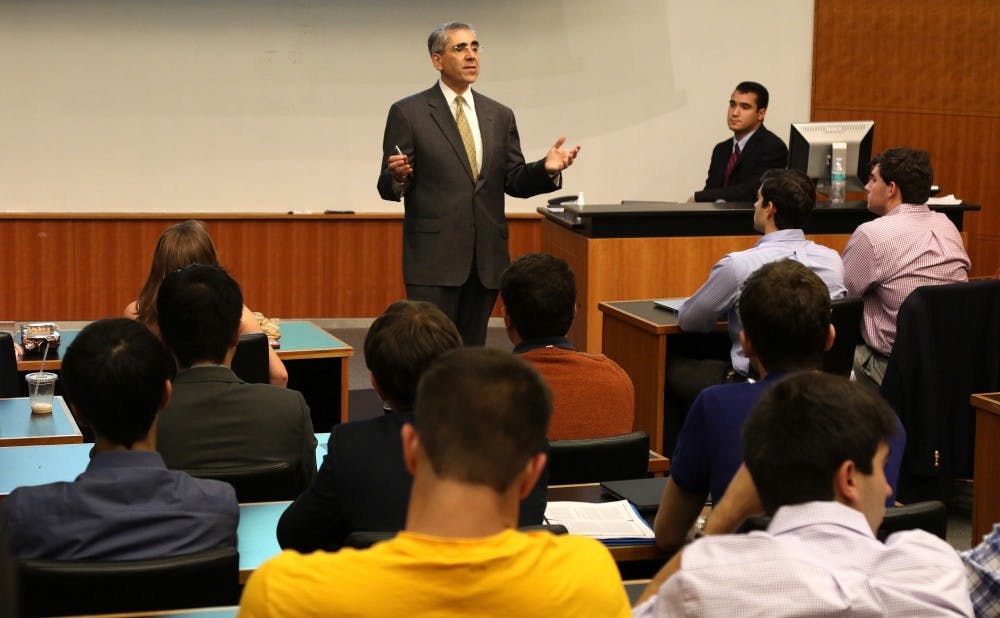Over four decades ago, Michael Schoenfeld took his first steps on Duke’s campus as an undergraduate. This July, he will graduate from his “second Duke education” — 14 years as the University’s chief spokesperson.
For over a decade, Schoenfeld, Trinity ‘84, has overseen communication for the Duke and its medical centers as the vice president for public affairs and government relations and chief communications officer. He was integral in the creation of Duke Kunshan University and led Duke in D.C., and was a visiting professor of the practice at the Sanford School of Public Policy, where he taught a course on media and politics.
But the road to his career at Duke was far from straightforward.
“You don’t go to college and say, ‘Oh, I think I want to be a chief external affairs officer for a major university,'” he said. “I didn’t know it at the time, but it was sparked at Duke.”
Schoenfeld graduated with a B.A. in public policy studies in 1984. His passion for media relations first stirred in his undergraduate years, where he helped launch WXDU, Duke’s FM radio station.

After graduating with a M.A. in public policy from Stony Brook University in 1986, Schoenfeld spent 11 years working in Washington, D.C. — seven with radio network Voice of America and four as the senior vice president for policy and public affairs at the Corporation for Public Broadcasting.
But it wasn’t until he was recruited as the vice chancellor for public affairs at Vanderbilt University in 1997 that Schoenfeld set foot on a college campus as an administrator — and quickly fell in love.
Shaping a global university
For Schoenfeld, a university is an “exhilarating and exciting” place, akin to a city complete with everything from utilities to international relations.
“Every part of the human experience from birth to death happens on these campuses,” he said. “You're involved in everything.”
When his alma mater recruited him for the vice president for public affairs and government relations position in 2008, Schoenfeld was reluctant to leave Vanderbilt. But after spending more time with then-President Richard Brodhead and other members of senior leadership, the opportunities Duke offered eventually became irresistible.
“It very quickly went from ‘How could I do this,’ to ‘How could I not do this?’” he said,
While some things—the Chapel, the biology building’s camel statue, Coach K—never change, Schoenfeld described being part of Duke’s rapid evolution to a global university as a “great honor and privilege.”
“There aren't many universities that have gone as far as Duke, as high as Duke, as quickly as Duke,” he said.” We're not even 100 years old yet.”
As the University’s chief ambassador, Schoenfeld worked to expand its global presence, traveling to Kazakhstan and Argentina, and advocating for Duke with media, governments and donors.
He was also instrumental in the foundation of Duke Kunshan University, which he calls “one small part of Duke’s global footprint” and is one of the accomplishments he is most proud of. He described the emotions associated with building “a university from scratch” — “exciting and exhilarating and frustrating and maddening and ultimately, fulfilling.”
“I’ve probably visited Kunshan 20 times, at least over the last 13 years, and every step, it’s watching it go from an empty field to a giant construction zone to a thriving campus,” he said.
Get The Chronicle straight to your inbox
Sign up for our weekly newsletter. Cancel at any time.
Schoenfeld also led Duke in D.C., which he refers to as the University’s “embassy in Washington.” Using an integrated model involving all aspects of the University under one roof, the office focuses on policy advocacy and education.
He was also a professor of the practice at the Sanford School of Public Policy, a pre-major advisor and is the founding advisor for TedxDuke. He still keeps in touch with students from his first classes and advisees.
Schoenfeld pointed to a black garment bag hanging behind his office door — his academic robes. He’s never missed an opportunity to march in them in convocation or commencement.
“If you're working in a university like Duke, and you don't take every opportunity to interact with students, then you're missing out on one of the great, unique benefits of being at a university,” he said.
‘There’s still 95% to go’
In August, Schoenfeld will join the Brunswick Group as a partner at the firm’s Washington, D.C. office. Duke will conduct a nationwide search for his successor, while Christopher Simmons, associate vice president for government relations, will serve as interim vice president for public affairs and government relations.
For Simmons, Schoenfeld is not only a colleague but an “outstanding mentor and friend.” He pointed to Schoenfeld’s expertise, as well as the innovative ideas he brought to the table.
“There are very few people, if any, that are as well respected in higher education, especially in the government relations [and] public affairs part of our world,” Simmons said.
Provost Sally Kornbluth wrote in an email to The Chronicle that she has “found his advice, wisdom and remarkably sensible perspective to be invaluable,” making him “one of the most trusted and thoughtful [advisors] to everyone on Duke’s leadership team.”
Schoenfeld expressed his confidence in the University’s choice for his successor, who he is sure will be “a top-notch talent that's going to make Duke even better than what I was able to.”
He also had a few words of advice for the position: the position “is an enormous privilege—a rare privilege, and use it well and use it wisely. And most importantly, have fun, because where else [but Duke]?”
Duke has been one of the “most important transformative institution[s]” in his life, Schoenfeld said. It’s the same place he got an education, became part of a network, and started on his career path. It’s also where he met his wife Elizabeth, Trinity ‘84.
Still, Schoenfeld believes that his second Duke education has proved more formative and valuable than the first. He was a better student these last 14 years, he said, as he took advantage of every opportunity to grow, to learn and to have his worldview tested.
“When I came in here, 14 years ago, I said, ‘We've accomplished a lot, but there's still 95% to go,’” he said. “And the best thing I can say is 14 years later, we've accomplished a lot, there's still 95% to go.”

Audrey Wang is a Trinity senior and data editor of The Chronicle's 120th volume. She was previously editor-in-chief for Volume 119.

